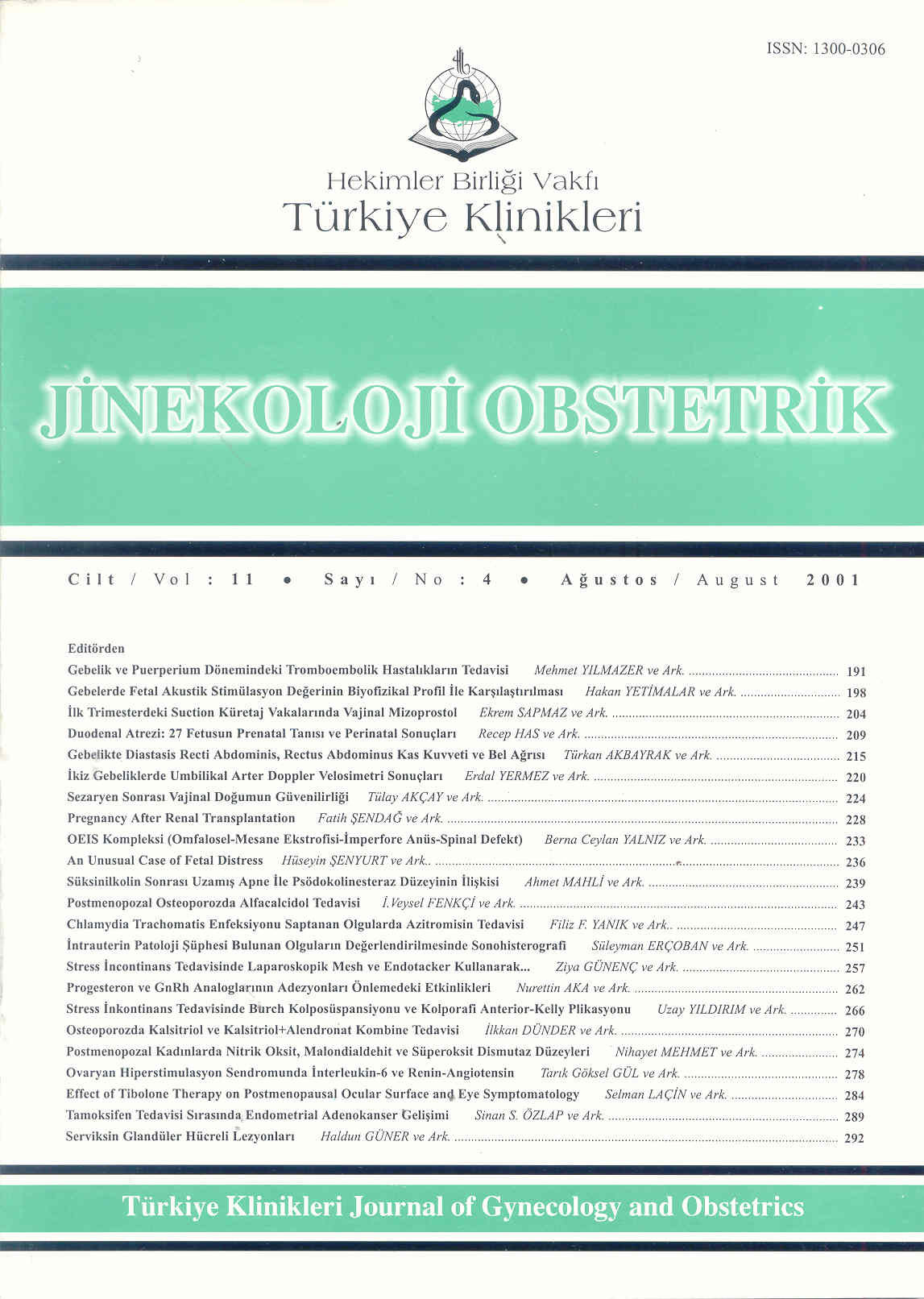Open Access
Peer Reviewed
ARTICLES
3377 Viewed1622 Downloaded
Treatment Of The Thromboembolic Disease During Pregnancyand Puerperium
Gebelik ve Puerperium Dönemindeki Tromboembolik Hastalıkların Tedavisi
Turkiye Klinikleri J Gynecol Obst. 2001;11(4):191-7
Article Language: TR
Copyright Ⓒ 2025 by Türkiye Klinikleri. This is an open access article under the CC BY-NC-ND license (http://creativecommons.org/licenses/by-nc-nd/4.0/)
ÖZET
Gebelik venöz tromboembolizm riskinin önemli ölçüde arttığı fizyolojik bir durumdur. Çok sık oluşmamakla beraber pulmoner embolizm maternal mortalite ve morbiditenin en önemli sebebidir. Gebelik ve puerperiumda venöz tromboembolik olayların teşhis ve tedavisi prospektif ve randomize çalışmaların yetersizliği nedeniyle halen çelişkilidir. Heparin gebelik ve puerperiumda anne ve fetüs için güvenli olduğundan seçilen antikoagulandır. Antepartum dönemde venöz tromboembolizm oluştuğunda uzun süre antikoagulasyon gerekmekle birlikte henüz en etkili rejim bulunamamıştır. Düşük moleküler ağırlıklı heparinler yeni sınıf antikoagulanlardır. Venoz tromboembolizm tedavi ve profilaksisinde heparinin yerini hızla almaktadırlar ve gebelik ve puerperiumda düşük moleküler ağırlıklı heparinlerle olan sınırlı sayıda deneyim cesaret vericidir. Uzun süreli heparin tedavisi osteoporoz ve trombositopeniye neden olabildiğinden postpartum dönemde heparin yerine tedavi warfarinle değiştirilmelidir.
Gebelik venöz tromboembolizm riskinin önemli ölçüde arttığı fizyolojik bir durumdur. Çok sık oluşmamakla beraber pulmoner embolizm maternal mortalite ve morbiditenin en önemli sebebidir. Gebelik ve puerperiumda venöz tromboembolik olayların teşhis ve tedavisi prospektif ve randomize çalışmaların yetersizliği nedeniyle halen çelişkilidir. Heparin gebelik ve puerperiumda anne ve fetüs için güvenli olduğundan seçilen antikoagulandır. Antepartum dönemde venöz tromboembolizm oluştuğunda uzun süre antikoagulasyon gerekmekle birlikte henüz en etkili rejim bulunamamıştır. Düşük moleküler ağırlıklı heparinler yeni sınıf antikoagulanlardır. Venoz tromboembolizm tedavi ve profilaksisinde heparinin yerini hızla almaktadırlar ve gebelik ve puerperiumda düşük moleküler ağırlıklı heparinlerle olan sınırlı sayıda deneyim cesaret vericidir. Uzun süreli heparin tedavisi osteoporoz ve trombositopeniye neden olabildiğinden postpartum dönemde heparin yerine tedavi warfarinle değiştirilmelidir.
ANAHTAR KELİMELER: gebelik, puerperium, tromboembolik hastalıklar, tedavi
ABSTRACT
Pregnancy is a physiologic state with a markedly increased risk for venous thromboembolism. Although it occurs infrequently, pulmonary embolism remains one of the most significant causes of maternal morbidity and mortality. The diagnoses and treatment of venous thromboembolic events during pregnancy and puerperium, however, remains controversial because of the lack of prospective, randomized trials. Heparin remains the anticoagulant of choice during pregnancy because of its proven safety for both the patient and the fetus. It is likely that long-term anticoagulation is necessary when venous thromboembolism occurs antepartum although the most efficacious regimen has yet to be established. Low molecular weight heparins are a new class of anticoagulants that are rapidly replacing heparin in the treatment of venous thromboembolism and limited experience with low molecular weight heparins during pregnancy and puerperium has been encouraging. Because long term heparin therapy has been associated with osteoporosis and thrombocytopenia warfarin should be substituted for heparin in the postpartum period.
Pregnancy is a physiologic state with a markedly increased risk for venous thromboembolism. Although it occurs infrequently, pulmonary embolism remains one of the most significant causes of maternal morbidity and mortality. The diagnoses and treatment of venous thromboembolic events during pregnancy and puerperium, however, remains controversial because of the lack of prospective, randomized trials. Heparin remains the anticoagulant of choice during pregnancy because of its proven safety for both the patient and the fetus. It is likely that long-term anticoagulation is necessary when venous thromboembolism occurs antepartum although the most efficacious regimen has yet to be established. Low molecular weight heparins are a new class of anticoagulants that are rapidly replacing heparin in the treatment of venous thromboembolism and limited experience with low molecular weight heparins during pregnancy and puerperium has been encouraging. Because long term heparin therapy has been associated with osteoporosis and thrombocytopenia warfarin should be substituted for heparin in the postpartum period.
MENU
POPULAR ARTICLES
MOST DOWNLOADED ARTICLES





This journal is licensed under a Creative Commons Attribution-NonCommercial-NoDerivatives 4.0 International License.










